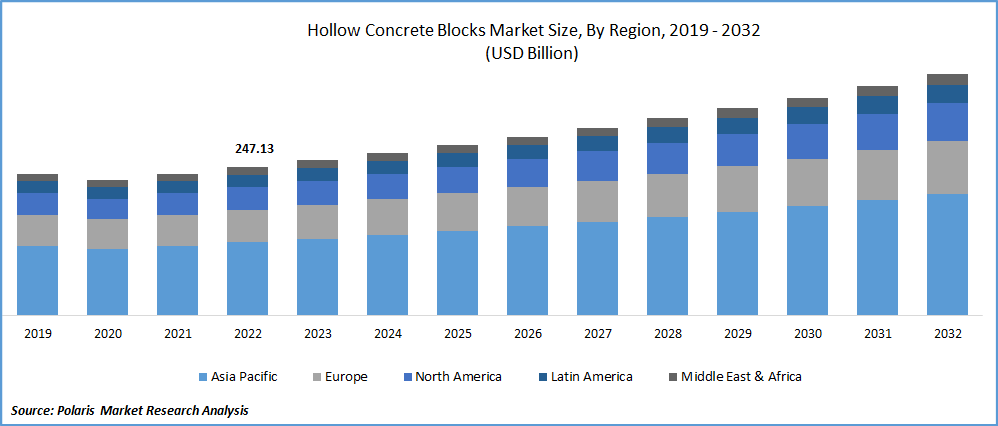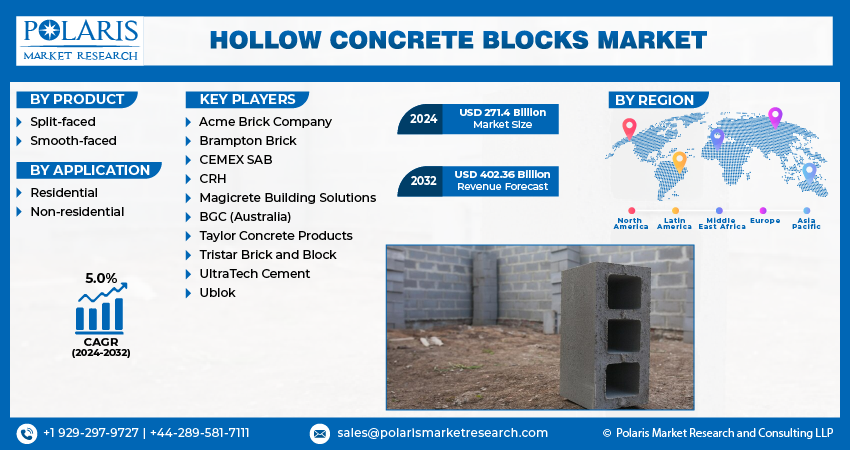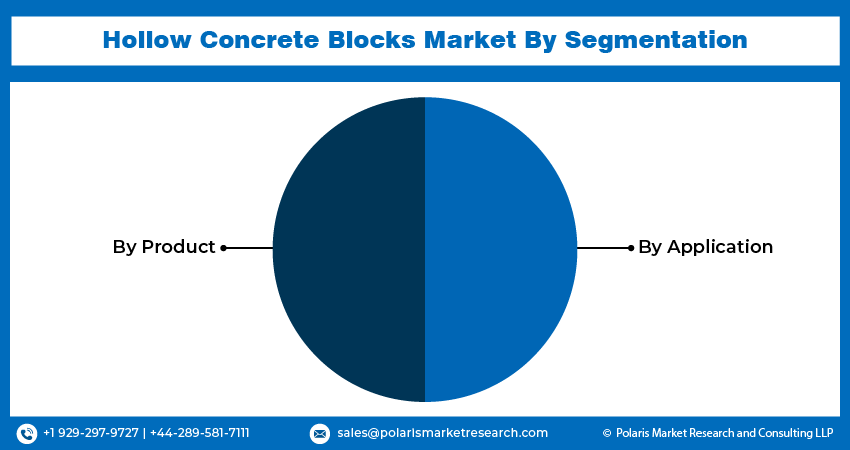
Hollow Concrete Blocks Market Share, Size, Trends, Industry Analysis Report
By Product (Split-faced, Smooth-faced); By Application (Residential, Non-residential); By Region; And Segment Forecasts, 2024 - 2032
- Published Date:Jan-2024
- Pages: 118
- Format: PDF
- Report ID: PM3497
- Base Year: 2023
- Historical Data: 2019-2022
Report Outlook
The global hollow concrete blocks market was valued at USD 258.92 billion in 2023 and is expected to grow at a CAGR of 5.0% during the forecast period. Hollow concrete blocks have several advantages over solid concrete blocks. Firstly, they are lighter in weight, which makes them easier to handle and transport. This results in faster and more efficient construction, which can lead to cost savings. Secondly, the hollow cores in the blocks provide better thermal and acoustical insulation than solid blocks. This means that buildings constructed with hollow blocks are better able to maintain a comfortable temperature and reduce noise levels. Thirdly, because of their hollow design, they require less maintenance compared to solid blocks. This is because water and moisture can drain out more easily, reducing the risk of cracking and other types of damage.

To Understand More About this Research: Request a Free Sample Report
Hollow concrete blocks have a wide range of applications in both residential and non-residential buildings. They are commonly used as load-bearing structures in low-rise residential buildings, as well as in institutional buildings such as schools and hospitals. In addition, hollow concrete blocks are often used in commercial buildings such as office buildings, warehouses, and retail spaces. They can also be used in the construction of shelter units for rural housing, where their thermal and acoustical insulation properties are particularly beneficial. Overall, hollow concrete blocks are a versatile building material that can be used in a variety of construction projects, both for load-bearing and non-load-bearing applications.
In earthquake-prone areas, hollow concrete blocks are often used in the construction of homes because they offer superior seismic resistance compared to other building materials. They have a low weight-to-volume ratio, which means that they can withstand the lateral forces generated by earthquakes without collapsing. In addition, the hollow cores of these blocks can be filled with concrete or insulation material, further enhancing their seismic resistance. Moreover, hollow concrete blocks are eco-friendly because they are made from natural materials such as cement, sand, and aggregate. They are also lightweight, which makes them easier to transport and handle, resulting in lower transportation costs and reduced carbon footprint.
While hollow concrete blocks offer durability and energy savings, they are more expensive than traditional clay bricks due to fluctuating concrete prices and regional variations in raw-material and transportation costs. The economic advantage gained from energy savings is partially offset by the higher cost of construction.

Industry Dynamics
Growth Drivers
The lightweight nature of hollow concrete blocks can result in reduced overall weight of structures, which can lead to cost savings and reduced construction time. Because of their lightweight, less steel required for a given R.C.C. building. This not only reduces the weight of the structure but also results in a reduction in the total cost of construction. Furthermore, these blocks are durable due to their manufacturing process. The concrete used in their production is compacted by high pressure and vibration, which gives significant strength to the blocks. This results in a block that can withstand a significant amount of weight and pressure without degrading or collapsing.
In addition, adequate curing of the blocks increases their compressive strength, which further enhances their durability. This means that structures built using hollow concrete blocks can last for many years with minimal maintenance or repair. Overall, the durability and strength of hollow concrete blocks make them a reliable and cost-effective building material for a variety of construction projects.
Report Segmentation
The market is primarily segmented based on product, application, and region.
|
By Product |
By Application |
By Region |
|
|
|
For Specific Research Requirements: Request for Customized Report
Split Faced Segment is Expected to Witness Fastest Growth During Forecast Period
Split faced segment registered faster growth in the forecast period. Split-faced hollow concrete blocks are a popular architectural concrete masonry unit (CMU) finish, particularly in non-residential construction projects. They offer an authentic textured face that appears to have been split or hand-chiseled, giving the block a natural and rustic look. Despite their handcrafted appearance, the manufacturing process for split-faced hollow concrete blocks is practical and efficient. The concrete slurry is poured into a form that already has the texture built into it, creating the desired textured face without the need for hand-chiseling.
The textured face of split-faced hollow concrete blocks makes them an ideal choice for both interior and exterior walls in commercial buildings, retaining walls, and decorative landscaping projects. Additionally, the blocks can be manufactured as a paint-grade product, allowing for further customization and versatility in design. Overall, split-faced hollow concrete blocks offer a cost-effective and practical solution for achieving a natural and textured look in construction projects.
These blocks offer many benefits that make them an ideal product for non-residential construction projects. One of their advantages is thermal efficiency, as the textured face of the block helps to reduce heat loss, which can result in lower energy costs. In addition, split-faced hollow concrete blocks are highly fire-resistant and sound-absorbing, making them a safe and practical choice for municipal buildings, schools, & theaters.
Smooth face segment concrete blocks registered largest market share and will continue its dominance during forecast period. Smooth-faced concrete blocks are manufactured under molds that result in a smooth finish on all sides of the blocks. The resulting product has a clean and polished appearance, making it ideal for use in both exterior and interior applications. The smooth finish of these blocks provides a fine natural look that is highly sought after in many architectural designs. They can be used to create modern, sleek, and contemporary designs, as well as traditional and classic styles.
Smooth-faced concrete blocks are durable and low maintenance, making them an excellent choice for building foundations, walls, and other structural elements. They are also resistant to weathering and fire, providing added safety and security to the building. Overall, smooth-faced concrete blocks offer a clean and polished look that is versatile, durable, and low maintenance. They are an excellent choice for architects, builders, and homeowners who are looking for a high-quality building material that provides a fine natural finish.
Residential Segment Garnered Largest Share
Residential segment held the largest share and is expected maintain its dominance over the study period. The growth of the construction industry, coupled with rising urbanization and population growth, is expected to drive the demand for hollow concrete blocks in the coming years. The trend towards sustainable and eco-friendly building materials is also expected to boost the demand for hollow concrete blocks, which are known for their durability, energy efficiency, and environmental friendliness.
Overall, the increasing investments in infrastructure and real estate development are creating promising hollow concrete blocks market opportunities for the hollow concrete block industry. As the demand for construction materials continues to grow, hollow concrete blocks are expected to play a significant role in meeting the needs of the construction industry. Countries continue to develop their infrastructure and urban areas expand, the demand for construction materials such as hollow concrete blocks are expected to increase. These blocks are widely used in the construction of residential and non-residential buildings, as well as in infrastructure projects such as bridges, tunnels, and roads.

APAC Registered with the Highest Growth Rate in the Study Period
APAC is projected to witness a higher growth rate during the forecast period. Region’s growth is primarily due to strong demand from applications such as residential and non-residential segments is likely to support the demand for different types of hollow concrete blocks, including split-faced and smooth-faced concrete blocks. Split-faced concrete blocks are particularly popular in non-residential applications such as municipal buildings, schools, & theaters.
These blocks are also valued for their thermal efficiency, fire-resistance, and sound-absorbing properties. Smooth-faced concrete blocks also widely used in both exterior and interior applications and are valued for their fine natural finish. They are versatile, durable, and low maintenance, making them an excellent choice for building foundations, walls, and other structural elements.

Competitive Insight
Some of the major players operating in the global market include Acme Brick Company, Brampton Brick, CEMEX SAB, CRH, Magicrete Building Solutions, BGC (Australia), Taylor Concrete Products, Tristar Brick and Block, UltraTech Cement, and Ublok.
Recent Developments
- In June 2021, Oldcastle APG acquired EP Henry. This will aid in expanding its distribution and manufacturing capabilities to strengthen their position in building materials.
- In February 2021, CEMEX completed the acquisition of Beck Readymix Concrete. With this acquirer was granted with 2 fully operated concrete mix plants. It will also help in increasing their production capacity in the San Antonio, Dallas, and Houston.
Hollow Concrete Blocks Market Report Scope
|
Report Attributes |
Details |
|
Market size value in 2024 |
USD 271.4 billion |
|
Revenue forecast in 2032 |
USD 402.36 billion |
|
CAGR |
5.0% from 2024 - 2032 |
|
Base year |
2023 |
|
Historical data |
2019 - 2022 |
|
Forecast period |
2024 - 2032 |
|
Quantitative units |
Revenue in USD billion and CAGR from 2024 to 2032 |
|
Segments covered |
By Product, By Application, By Region |
|
Regional scope |
North America, Europe, Asia Pacific, Latin America, Middle East & Africa |
|
Key companies |
Acme Brick Company, Brampton Brick, CEMEX SAB, CRH, Magicrete Building Solutions, BGC (Australia), Taylor Concrete Products, Tristar Brick and Block, UltraTech Cement, and Ublok |
FAQ's
key companies in hollow concrete blocks market are Acme Brick Company, Brampton Brick, CEMEX SAB, CRH, Magicrete Building Solutions, BGC (Australia), Taylor Concrete Products.
The global hollow concrete blocks market is expected to grow at a CAGR of 5.0% during the forecast period.
The hollow concrete blocks market report covering key segments are product, application, and region.
key driving factors in hollow concrete blocks market are growing awareness among consumers for lightweight materials.
The global hollow concrete blocks market size is expected to reach USD 402.36 billion by 2032.
